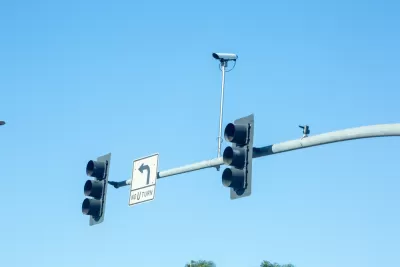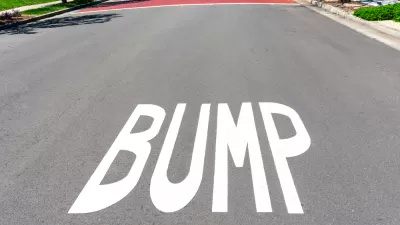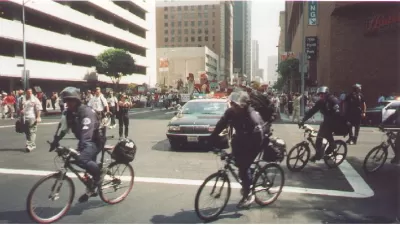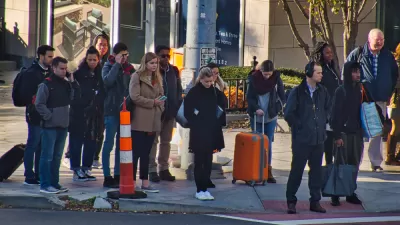The state of Texas decided to preempt local traffic safety laws by banning all red light camera programs.

"Texas Gov. Greg Abbott on Saturday signed a bill to ban red light cameras statewide," report Jeff Bell and Ashley Goudeau.
Gov. Abbott was signing House Bill 1631, approved by both houses in the Texas legislature in May. The bill forces cities to phase out existing red light cameras. "It requires cities and counties that are able to get out of their contracts with red light camera vendors to do so," according to the article. Five cities have contracts that prevent immediate action to end contracts with red light camera options.
According to Bell and Goueau, the political debate surrounding the bill squared Rep. Jonathan Stickland (R-Bedford) against Rep. Ramon Romero (D-Fort Worth). Rep. Romero tied red light cameras to traffic safety, while Rep. Strickland suggested that the cameras infringe on constitutional rights and don't actually stop drivers from running red lights.
Studies of Chicago and Houston have shown that red light cameras improve traffic safety. A study of 158 cities found that fatal crashes increased by 30 percent in cities that removed red light cameras as compared to those that continued to operate cameras.
The bill seemed unlikely to make it out committee in April, but overcame the final obstacles on the way to approval. Gov. Abbott posted a triumphant video of himself signing the new law into effect to Twitter .
I just signed the law that bans red light cameras in Texas. #txlege pic.twitter.com/AyF28hxGwO
— Greg Abbott (@GregAbbott_TX) June 1, 2019
The Associated Press also provides coverage of the bill's signing.
FULL STORY: Gov. Abbott signs bill banning red light cameras in Texas

Planetizen Federal Action Tracker
A weekly monitor of how Trump’s orders and actions are impacting planners and planning in America.

Restaurant Patios Were a Pandemic Win — Why Were They so Hard to Keep?
Social distancing requirements and changes in travel patterns prompted cities to pilot new uses for street and sidewalk space. Then it got complicated.

Map: Where Senate Republicans Want to Sell Your Public Lands
For public land advocates, the Senate Republicans’ proposal to sell millions of acres of public land in the West is “the biggest fight of their careers.”

Maui's Vacation Rental Debate Turns Ugly
Verbal attacks, misinformation campaigns and fistfights plague a high-stakes debate to convert thousands of vacation rentals into long-term housing.

San Francisco Suspends Traffic Calming Amidst Record Deaths
Citing “a challenging fiscal landscape,” the city will cease the program on the heels of 42 traffic deaths, including 24 pedestrians.

California Homeless Arrests, Citations Spike After Ruling
An investigation reveals that anti-homeless actions increased up to 500% after Grants Pass v. Johnson — even in cities claiming no policy change.
Urban Design for Planners 1: Software Tools
This six-course series explores essential urban design concepts using open source software and equips planners with the tools they need to participate fully in the urban design process.
Planning for Universal Design
Learn the tools for implementing Universal Design in planning regulations.
Heyer Gruel & Associates PA
JM Goldson LLC
Custer County Colorado
City of Camden Redevelopment Agency
City of Astoria
Transportation Research & Education Center (TREC) at Portland State University
Camden Redevelopment Agency
City of Claremont
Municipality of Princeton (NJ)





























